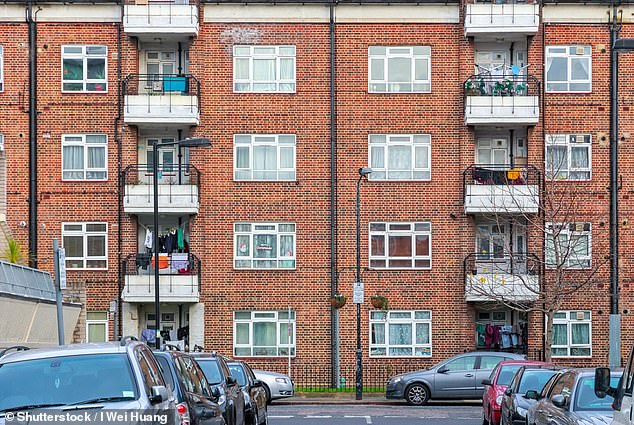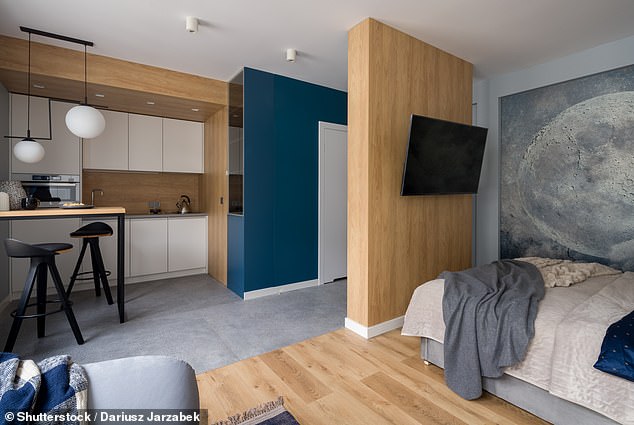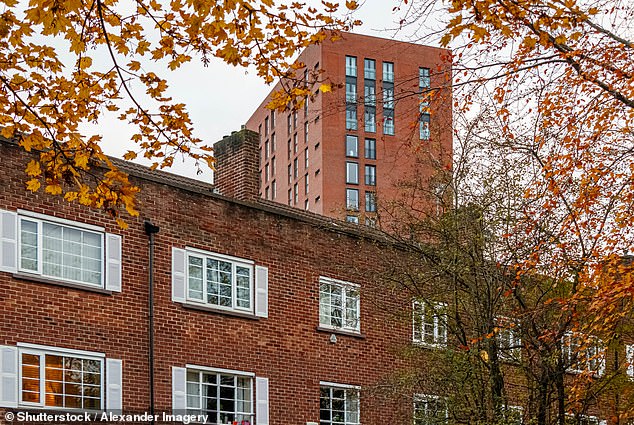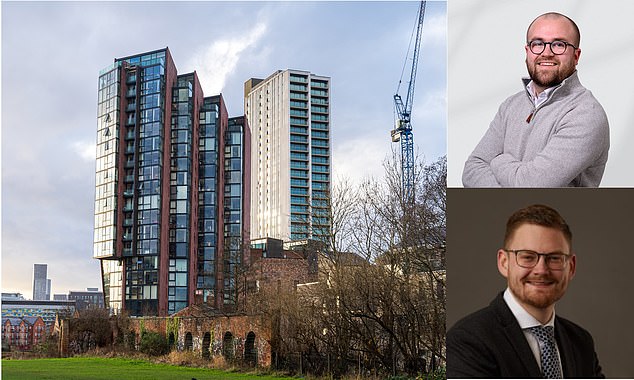Table of Contents
I am a first time buyer and hoping to get on the real estate ladder this year.
I had an offer accepted for a flat in one of the cheapest areas of Greater Manchester. It’s walking distance to the city center where I work and is being sold at a price I can afford. I paid a fee of £2,000 to reserve the apartment.
The property is an off-plan new build that will be completed in three months, so I didn’t think there would be any problems. Neither did my mortgage broker, who provided me with an agreement in principle.
New build dilemma: Our reader already lost £2,000 booking their new build apartment, but now their mortgage application has been rejected (stock image)
However, the mortgage valuation has now indicated that there is a “lack of owner/occupiers living in the immediate area” and that it is “not in a salable location”. Therefore, the application has been rejected.
My broker said they could try again with another lender, but the application would be at the mercy of the comments of the next appraiser, who might say the same thing.
Does this mean no lender will offer me a mortgage? Can I lose my £2000 booking fee? Would it be unwise to continue anyway in case future buyers face the same problem and you are unable to sell the flat in the future?
Ed Magnus from This is Money responds: Mortgage appraisals are an often underrated part of the home buying process.
When purchasing with a mortgage, the lender will always carry out their own independent valuation of the property.
Many borrowers see it as a formality. But just as a mortgage lender can decide not to lend to a particular person, he can also decide not to lend to you on a particular property.
The valuer or surveyor may also value the property at less than what you agreed to pay, known as a reduced valuation, which has implications for the mortgage.
Lenders typically have specific criteria that outline the types of property they will not grant mortgages on.
These usually include a minimum size, often no less than 30 square meters or 323 square feet, which can be problematic for people buying studio apartments.

Ex-premises: Ex-municipal flats can be a problem during mortgage valuations if it is considered that there is a lack of demand from other owner-occupiers
Similarly, they might exclude newly built houses or flats on the upper floors of high-rise apartments, as they think they may lose value or be difficult to sell.
There could also be problems if they feel that the length of the lease is too short, in the case of leasehold properties, or that the service charge or ground rent is too high.
Some lenders will not consider ex-local authority-owned homes unless the valuer believes there is adequate demand for owner occupation.
Other types of property that can cause problems include apartments over commercial spaces such as shops or restaurants.
NatWest, for example, says its valuers will consider aspects that may affect the “marketability” of a property, such as noise, odours, unsocial opening hours and fire risk, along with location and demand.
Ultimately, the lender wants to be sure that the property can be sold in the future, so that they can get their money back in full if it were repossessed.
Your situation is particularly frustrating as it seems to be less of an issue with the property itself and more of an issue with the immediate area.
But that doesn’t necessarily mean that no lender will offer a mortgage on a property in that particular area.
You may want to try your luck again with a different lender, given you’ve already paid the £2,000 booking fee, although making multiple mortgage applications can start to have an impact on your credit score.
It would be worth speaking to a mortgage broker to see if they can recommend a different lender using a different surveying company.
It may also be worth double-checking the terms of the booking fee or speaking to your solicitor in case it is refundable.
For expert advice, we spoke to Chris Sykestechnical director of the mortgage brokerage Private Finance, and Ben Fullerassociate of the mortgage brokerage SPF Private Clients.

Too small: some lenders do not consider studios smaller than 30 m2
How common is this problem?
Chris Sykes responds: We have seen this in certain areas of Manchester, Liverpool and Birmingham, where large blocks of flats are mainly bought by buy-to-let investors.
Sometimes these blocks are built by developers who sell off-plan and most of the properties go to investment companies or foreign individuals who buy them for cash.
The remaining flats will then be sold on the open market.
Appraisers and lenders consider these properties to be less than ideal security, as there are concerns that tenants will not take care of the properties as well as owners would.
What should they do?
Ben Fuller replies: In this situation, where the lender’s valuer has rejected the property due to its location or surrounding area, you will need to move forward with a different lender who essentially uses a different valuer or surveyor.
Many lenders will use the same independent valuer in an area, so you may go from, say, Barclays to Santander, only to discover that the bank sends the same valuer to value the property, so the result doesn’t change.

The problem of our readers’ valuation often arises in certain areas of Manchester, Liverpool and Birmingham, where blocks of flats are bought by investors and not their owners.
The other problem you want to avoid is asking another lender to reject the application, then another, and so on, ending up with multiple applications and “footprints” on your credit file, which won’t help your overall position.
To mitigate the risk of this happening, you should use a broker who can submit property details to lenders and appraisers prior to showing to ensure there is a strong indication that the lender will proceed before you apply.
Chris Sykes responds: It can be difficult to borrow on these properties, both as an investor and as someone who wants to make them their home.
I fully appreciate that this is a dead end. If people can’t buy it as a home, then the problem continues.
There are some considerations you should make. Firstly, will you have difficulty selling the property in the future?
Could that mean you’ll end up losing more of your £2,000 booking fee in the long run if you go ahead and buy this property?
Lenders’ criteria and buyers’ ideals change over time, making this question difficult to answer.

Experts: Chris Sykes, technical director at mortgage broker Private Finance (left) and Ben Fuller, associate at mortgage broker SPF Private Clients
We have been successful in obtaining mortgages on these types of properties in the past, so you could see if your broker can manage the property through a selection of lenders, to see if any of them would lend on the apartment; maybe you can find one who has already done it. I took out a mortgage on the block.
You can also approach developers to see if anyone has managed to get a residential mortgage and use the same lender.
Or you could ask to see what the real divide is between buy-to-let investors and home buyers on the block.
If you want to proceed with the purchase, ask a lender to use a different appraisal company than the one you initially used. Another appraiser may not share the same concerns.
Will they be able to recover the amount of the reservation?
Ben Fuller adds: I have come across clauses in the booking documentation which state that if the buyer is unable to obtain a mortgage then they should be entitled to a refund of the booking fee.
Ask your attorney to review the documentation to see if this is possible, in case a solution cannot be found with another lender.
Keep in mind that even if you manage to obtain a mortgage on your purchase, these difficulties could arise again when you try to sell.
However, if you’ve only tried one lender, there’s a chance you haven’t had any luck and there may be several other lenders who are prepared to consider your application.
Always use a broker as they know the best lenders to go to and the best way to go about it.
Some links in this article may be affiliate links. If you click on them, we may earn a small commission. That helps us fund This Is Money and keep it free to use. We do not write articles to promote products. We do not allow any commercial relationship to affect our editorial independence.



